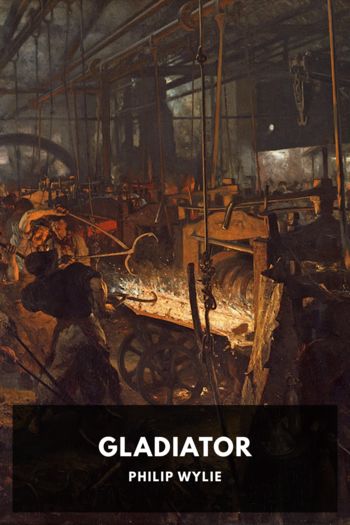Gladiator - Philip Wylie (readnow .TXT) 📗

- Author: Philip Wylie
Book online «Gladiator - Philip Wylie (readnow .TXT) 📗». Author Philip Wylie
Afterwards, going home again in the gloom of late night, he looked up at the stars and they stood still. He realized that a certain path of life had been followed to its conclusion. He felt initiated into the adult world. And it had been so simple, so natural, so sweet. … He threw a great stone into the river and laughed and walked on, after a while.
Through the summer that followed, Hugo and Anna ran the course of their affair. They loved each other violently and incessantly and with no other evil consequence than to invite the open “humphs” of village gossips and to involve him in several serious talks with her father. Their courtship was given the benefit of conventional doubt, however, and their innocence was hotly if covertly protested by the Blakes. Mrs. Danner coldly ignored every fragment of insinuation. She hoped that Hugo and Anna would announce their engagement and she hinted that hope. Hugo himself was excited and absorbed. Occasionally he thought he was sterile, with an inclination to be pleased rather than concerned if it was true.
He added tenderness to his characteristics. And he loved Anna too much. Toward the end of that summer she lost weight and became irritable. They quarrelled once and then again. The criteria for his physical conduct being vague in his mind, Hugo could not gauge it correctly. And he did not realize that the very ardour of his relation with her was abnormal. Her family decided to send her away, believing the opposite of the truth responsible for her nervousness and weakness. A week before she left, Hugo himself tired of his excesses.
One evening, dressing for a last passionate rendezvous, he looked in his mirror as he tied his scarf and saw that he was frowning. Studying the frown, he perceived with a shock what made it. He did not want to see Anna, to take her out, to kiss and rumple and clasp her, to return thinking of her, feeling her, sweet and smelling like her. It annoyed him. It bored him. He went through it uneasily and quarrelled again. Two days later she departed.
He acted his loss well and she did not show her relief until she sat on the train, tired, shattered, and uninterested in Hugo and in life. Then she cried. But Hugo was through. They exchanged insincere letters. He looked forward to college in the fall. Then he received a letter from Anna saying that she was going to marry a man she had met and known for three weeks. It was a broken, gasping, apologetic letter. Every one was outraged at Anna and astounded that Hugo bore the shock so courageously.
The upshot of that summer was to fill his mind with fetid memories, which abated slowly, to make him disgusted with himself and tired of Indian Creek. He decided to go to a different college, one far away from the scene of his painful youth and his disillusioned maturity. He chose Webster University because of the greatness of its name. If Abednego Danner was hurt at his son’s defection from his own college, he said nothing. And Mrs. Danner, grown more silent and reserved, yielded to her son’s unexpected decision.
Hugo packed his bags one September afternoon, with a feeling of dreaminess. He bade farewell to his family. He boarded the train. His mind was opaque. The spark burning in it was one of dawning adventure buried in a mass of detail. He had never been far from his native soil. Now he was going to see cities and people who were almost foreign, in the sophisticated East. But all he could dwell on was a swift cinema of a defeated little boy, a strong man who could never be strong, a surfeited love, a truant and dimly comprehensible blonde girl, a muddy street and a red station, a clapboard house, a sonorous church with hushed puppets in the pews, fudge parties, boats on the little river, cold winter, and ice over the mountains, and a fortress where once upon a time he had felt mightier than the universe.
VIThe short branch line to which Hugo changed brought him to the fringe of the campus. The cars were full of boys, so many of them that he was embarrassed. They all appeared to know each other, and no one spoke to him. His dreams on the train were culminated. He had decided to become a great athlete. With his mind’s eye, he played the football he would play—and the baseball. Ninety-yard runs, homers hit over the fence into oblivion. Seeing the boys and feeling their lack of notice of him redoubled the force of that decision. Then he stepped on to the station platform and stood facing the campus. He could not escape a rush of reverence and of awe; it was so wide, so green and beautiful. Far away towered the giant arches of the stadium. Near by were the sharp Gothic points of the chapel and the graduate college. Between them a score or more of buildings rambled in and out through the trees.
“Hey!”
Hugo turned a little self-consciously. A youth in a white shirt and white trousers was beckoning to him. “Freshman, aren’t you?”
“Yes. My name’s Danner. Hugo Danner.”
“I’m Lefty Foresman. Chuck!” A second student separated himself from the bustle of baggage and young men. “Here’s a freshman.”
Hugo waited with some embarrassment. He wondered why they wanted a freshman. Lefty introduced Chuck and then said: “Are you strong, freshman?”
For an





Comments (0)